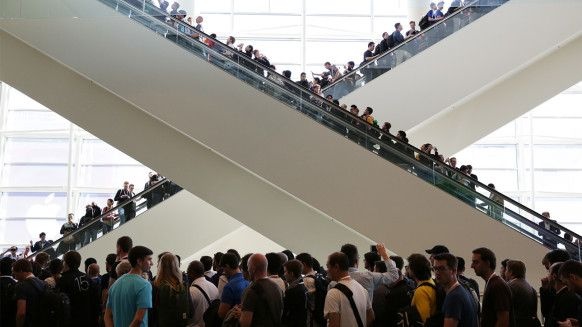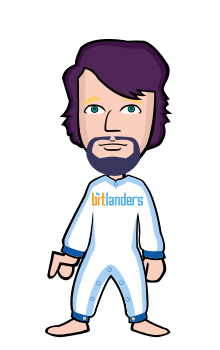
JUST IN CASE you forgot, great artists steal.
It was like déjà vu inside the cavernous hall on the third floor of San Francisco’s Moscone Center. Google was here 10 days ago; Microsoft only a few weeks earlier. Over the course of a two-hour keynote on Monday, Apple introduced a litany of software and services that sounded awfully familiar.
Virtually everything Apple announced, someone’s done before. Split-screen multitasking! Samsung did it. A smart, context-aware personal assistant! Google. Snap two full-screen windows! Microsoft. Natural-language search! Google and Microsoft. Pin tabs! Chrome. Music! Pick your favorite of a hundred streaming music apps. Powerful notes app! Transit directions! Rewards programs for mobile payments! A news reader! Old, old, old, and old.
 Click to Open Overlay Gallery
Click to Open Overlay GalleryIn many way, this sameness is a good thing. There’s no reason to come up with weird new ways to show two apps side by side when the Windows way works just fine, and thank goodness Android ditched its copy-paste setup for Apple’s obviously better method. In general, there’s real power in the notion that you know what your device can do, and how to use it, no matter what device it is. The amazing part is just how far the similarities go: The powerful consumer tech companies of our era, from Google to Microsoft to Apple to Samsung to Amazon and beyond, have begun to want, and build, almost exactly the same things. (Amazon was the last to try something truly different with the Fire Phone. That went poorly.) Sometimes the similarities are subtle—common gestures and interface paradigms. Others are blindingly obvious, like Windows just giving up and natively supporting iOS and Android apps. As these companies continually copy, we’re reaching something approaching perfect platform parity. The platform wars are over. The industry has collectively come to one idea about how we’ll use technology.
Call it The Perfect Operating System. Once these updates are rolled out and the services are turned on, your phone will run something a lot like The POS no matter what it is. (That acronym feels about right, by the way.)
In The POS, you’ll do almost everything by talking to your device. You’ll grab it off the table, unlock it with your fingerprint, and just start chatting. Your device will be always listening, waiting for you to issue a command or ask a question. Siri figured powerfully into Apple’s WWDC keynote as the brain behind everything from context-aware search to replying to emails via Apple Watch. Apple’s software chief Craig Federighi bragged about Siri’s 5 percent word error rate, and opened its functionality to developers in more and more useful ways. Meanwhile, Google keeps talking about Google Now, the power of voice search, and its own dramatically-shrinking error rate. Cortana, Microsoft’s personal assistant, is the flagship feature of Windows 10. The most important difference between the three is what you call them; you’ll ask them all the same questions the same way, and get the same answers in the same places.
Your POS phone will know you. Like really know you. It’ll use your history, your preferences, your location, even your current emotional state to figure out exactly what you want, when you want it, and deliver it. The interaction will be more conversational, too: Siri, remind me to grab that folder when I’m on my way out the door. Cortana, what time’s the movie again? Okay Google, can I move that meeting to Thursday?
It’s not just core, platform-level stuff, either. No matter what we use, our Maps had better involve transit directions, because driving’s dead. Didn’t you hear? Our wallets are done for, too. Streaming music is everyone’s future, as are superpowered note-taking apps. When you’re on a tablet, you’ll swipe from the edge to bring in a new app, and you’ll move a tiny slider to re-size the apps in your full-screen window. For a while, our phones were our workshops, with all the tools laid out right where we left them and ready for work on whatever we wanted. Now they’re becoming factories—just press the button, and the finished product comes out the other side.
You can prefer one design or another, but that will be the only thing separating iOS from Android and Android from Windows. They’re just skins at this point. You’ll have access to all the same apps, all the same services. Apple Music is on Android; Microsoft Outlook is the best email app on the iPhone. Windows, in case you forgot, just flat-out runs Android and iOS apps. The mobile industry briefly looked like a winner-take-all fight to the death, but it has instead become essentially a single shared laboratory of ideas. Apple’s not killing Android, so it’s playing nice; and Google’s not crazy enough to keep Google Maps and Gmail off the iPhone. There are a few differentiators left, sure—Apple’s promise to keep your data safe, Google’s promise to give developers better tools—but they don’t matter to most users. A phone is a phone is a phone.
 Click to Open Overlay Gallery
Click to Open Overlay GalleryThis convergence feels like the end of a phase, the only logical conclusion. Nearly a decade ago, our smartphones became our lives. They subsumed our free time and attention spans, they became our conduit to a hundred thousand things we could never access before. Apple’s video about the power of the App Store to celebrate 100 billion downloads was poignant and true; apps changed everything. They brought the world into our smartphones. Then our smartphones became our world, so we built assistants to manage them.
That’s the only plan anyone seems to have. Every powerful company has the same ideas, arrives at the same conclusions, apes the same features and builds the same products. Of course, there’s a huge benefit to this status quo: interoperability. When everyone arrives at the same idea, it stops being copycatting, and it just starts being right.
Maybe this is what we need. When everyone and everything is online, platform barriers stop being interesting and start being a pain. My Google Car needs to not crash into your Apple Car, for one thing. And when so many people have a computer at work, a different computer at home, two phones, and a smartwatch, cross-platform functionality is a victory.
But are we predestined to a decade-long game of high-stakes Jinx, where everyone races to launch the same thing first? There are wild new ideas inside research labs everywhere: gesture control, touch-enabled pants, cameras that reads your emotions! The roadmap doesn’t have to be written already, the answers don’t have to be obvious. When there’s so much at stake, though, none of those crazy ideas make it to this huge stage at Moscone. And for better or worse, that’s the one that matters.



